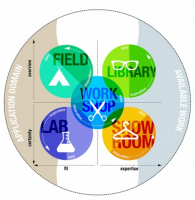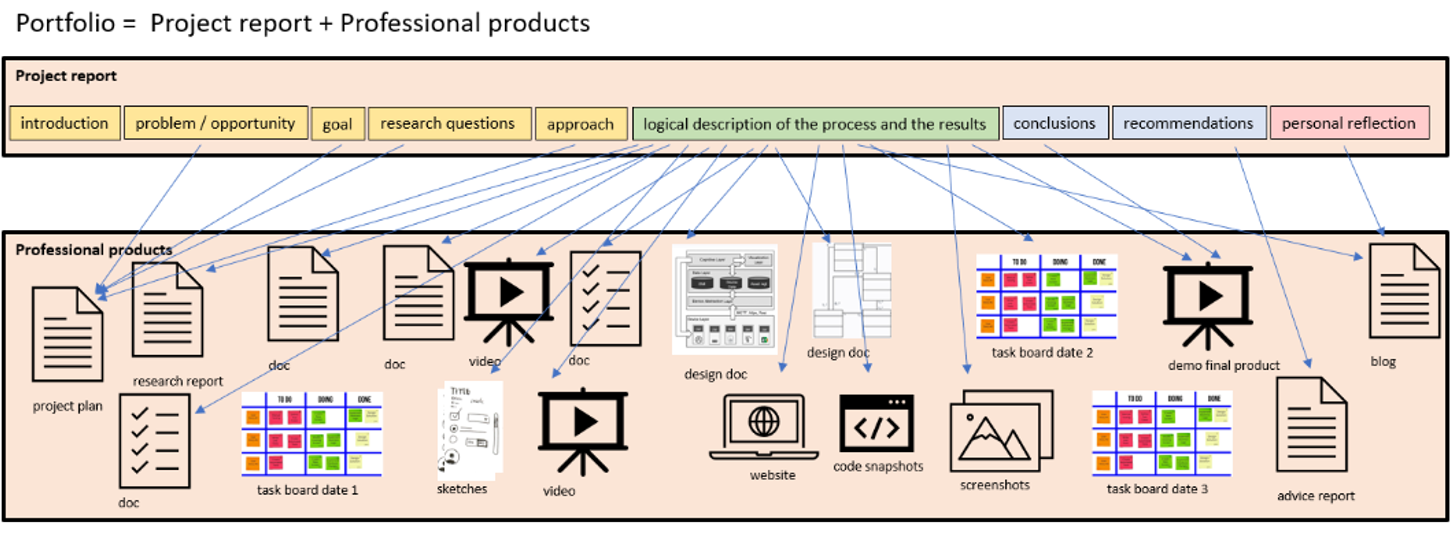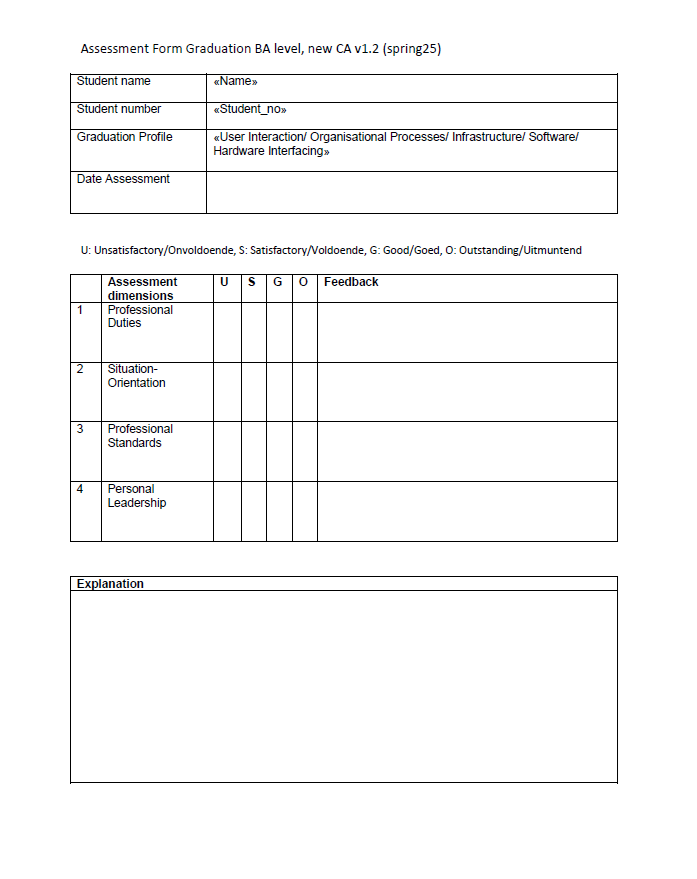More information on the role of external expert
The graduation project
Acquiring the graduation project.
The graduation student acquires his own final project. He independently conducts applied research in a defined project, demonstrating compliance with the requirements set. The criteria that the graduation organization and the company supervisor must meet are established and can also be found in the internship guide mentioned above.
Approval of the project proposal
The graduation coordinator reviews and approves the assignment based on a proposal. This is done in consultation with specialized course lecturers who are also the intended first assessors. Then 2 lecturers (1st and 2nd assessor) are linked to the graduation project where we match the expertise of the lecturers as closely as possible with the IT sub-domain of the graduation project.
In addition to connecting to an IT sub-domain, a graduation project must also include an element of applied research. For research skills and methodology, Fontys ICT uses the Design-Oriented Triangulation framework(DOT framework). Conscious choices, justification of the applied research conducted and the developed IT professional product, IT artifact or Proof of Concept are delivered in the form of a portfolio. In other words, applied research is thus dominated by the methodical acquisition of knowledge for the creation of professional products [Andriessen, 2014] The research we expect from students is thus not scientific, but is in the service of the professional IT products to be delivered, which the student collects in a portfolio during graduation....
Figure 1 DOT Framework with the domains of application, innovation space and available work overlaid with the five strategies of Field, Library, Workshop, Lab and Showroom that contain applicable methods for the strategies.

Figure 1 DOT Framework with the domains of application, innovation space and available work overlaid with the five strategies of Field, Library, Workshop, Lab and Showroom that contain applicable methods for the strategies.
Roles at graduation
During the graduation semester, the student successively deals with the following roles:
- Graduation coordinator: review and agreement on the graduation project and otherwise available for questions or special situations;
- Teacher supervisor or first assessor: remote supervision from school, with weekly contact moments; he monitors the process, the quality of the professional products and follows and assesses the content of the execution as far as possible;
- Examiner or second assessor: lecturer who co-assesses at intermediate products or milestones, such as the project plan, Midterm Review and final assessment and he is chairman of the graduation session;
- Company supervisor: daily supervision with more focus on content;
- External Expert: advice in the assessment process and evaluation of the process and quality of assessment; quality assurance by attending multiple sessions, possibly of different HBO-i architecture layers.
- Student Desk: administrative support.
The jury in the graduation session consists of both assessors, they determine the final result where the decision lies with the second assessor. The company supervisor and external expert are part of the jury with an advisory voice.
The process
After a short preliminary investigation, the student delivers a project plan in study week 5. This forms the basis for the research, and is partly assessed by the second assessor. The first assessor makes two visits to the student at the company. The first time there is an acquaintance and the assignment is explained and fine-tuned so that it is both suitable for achieving the learning outcomes set by Fontys and leads to a meaningful and valuable contribution in the field of IT for the company or institution where the project takes place. The second and last time is at the end before the project delivery to the company and at this time the first assessor meets with the company supervisor to discuss an initial coordination of the assessment. Halfway through the course there is a return day with student-intervision and a Midterm Review by both assessors which includes feedback from company supervisor and student.
Work delivered
During his final project, the student regularly submits professional products via the learning environment Canvas, so that the teacher-supervisor can monitor and supervise his progress. In study week 17, the student submits the final version of his portfolio which includes the research design, justification for the execution and results and findings of the research.
In addition to the professional products, the student prepares a project report that helps the jurors provide a picture of the process followed, conclusions, recommendations and reflection, and explains how the professional products fit into the overall project. The project report and professional products make up the portfolio available to the jury.
The format of the portfolio is chosen by the student appropriate to the completed IT end product and the IT work area. This can be with more focus on program code as in a software engineering project, or for example a more extensive project report explaining a developed Business Intelligence dashboard with code, screenshots and often a reference to a consultancy report.

The portfolio submitted should give a complete picture of the final project, but it is also important that it is easily accessible by a logical structure and contains only relevant content. Tip: Read the Project Report first, and based on that, determine which products from the portfolio you will review and which you will not (or only globally).
The Graduation Conference
Graduation sessions are organized into a Graduation Conference. These graduation sessions can be attended by interested parties from the student's personal circle as well as lecturers, students, Partners in our education ('Partners in Education' and 'Partners in Innovation') and other interested parties in the IT field of the final project in question.
The student presents his research and demonstrates the developed IT product. After the presentation there is a brief opportunity for questions by those present. This is followed by the student's defense before the jury. Then the final assessment is determined by the two assessors where the company supervisor and external expert are heard in the role of advising juror. This part is not open to the public.
In principle, the hearing is open to the public. When the company demands confidentiality, or the student requests it for reasons of his own, the session is held in private. Then only the jury is present.
The assessment
The student is informed in advance of the learning outcomes, which he must demonstrate at a sufficient level during his final project. The assessment is a holistic assessment, in which all learning outcomes are evaluated against the criteria applicable to the relevant HBO-i architecture layer.
The assessment is represented by a letter, being O (Outstanding), G (Good), S (Sufficient) U (Unsufficient). The assessment form used is attached in the Appendix. The form contains a further explanation of the learning outcomes and the assignment of the assessment. This form is completed by both assessors after the assessment.
The Role of External Expert
The External Expert oversees the quality of the assessment process during the graduation session and is advisory during the assessment. In addition, by attending multiple sessions, he can observe and calibrate across sessions and topics. Upon completion, an evaluation takes place in which he shares his findings, which we take into account to ensure our quality.
Applying for assessments.
Around study week 12-14, the graduation sessions website is shared with the External Experts, as well as an online site to apply for the sessions. Of the sessions, it lists the student, topics briefly, and the scheduled date and time and whether the graduation work is confidential. If the graduation work is confidential, the external expert is expected to keep the relevant portfolio and information obtained confidential and delete/destroy all data after the graduation sessions. In these cases, the external expert must have signed the general confidentiality statement (available from the student desk).
Appendix: Assessment form.
Sample assessment form:
